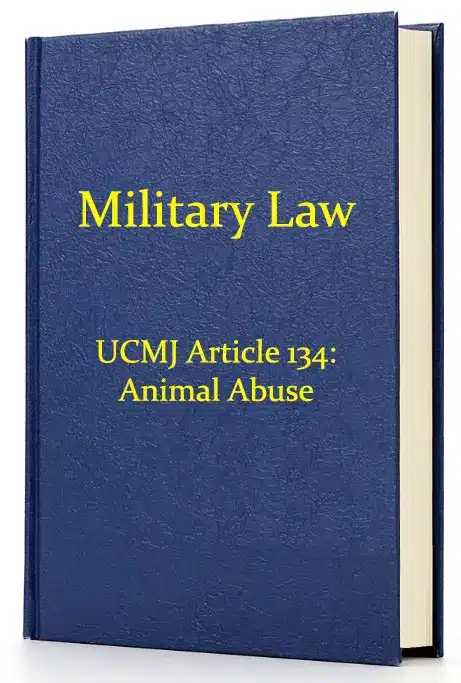Article 134 of the MCM states that there are two different categories encompassed by Article 134 – Animal Abuse, and each has their own set of elements that must be present for conviction.
A conviction of abuse, neglect, or abandonment of an animal requires the prosecution to demonstrate that:
-
the accused wrongfully abused, neglected, or abandoned a particular animal; and
-
under the circumstances, the conduct of the accused was either (i) to the prejudice of good order and discipline in the armed forces, (ii) was of a nature to bring discredit upon the armed forces, or (iii) to the prejudice of good order and discipline in the armed forces and of a nature to bring discredit upon the armed forces.
-
If the actions of the accused resulted in severe injury or death of the animal, it is also an applicable element, and the possible aspect of the animal is a “public” animal.
A conviction of sexual act with an animal requires evidence that:
-
the accused engaged in a sexual act with a particular animal; and
-
under the circumstances, the conduct of the accused was either (i) to the prejudice of good order and discipline in the armed forces, (ii) was of a nature to bring discredit upon the armed forces, or (iii) to the prejudice of good order and discipline in the armed forces and of a nature to bring discredit upon the armed forces.
Understanding Article 134 (Animal Abuse) of the UCMJ
Generally, this offense prohibits intentional abuse, culpable neglect, and abandonment of an animal. It does not include legal hunting, trapping, or fishing; reasonable and recognized acts of training, handling, or disciplining an animal; normal and accepted farm or veterinary practices; research or testing conducted by approved governmental protocols; protection of person or property from an unconfined animal; or authorized military operations or military training.
For this article, abuse refers to intentionally and unjustifiably overdriving, overloading, overworking, tormenting, beating, depriving of necessary sustenance, allowing to be housed in a manner that results in chronic or repeated severe physical harm, carrying or confining in or upon any vehicles cruelly or recklessly, or otherwise mistreating an animal. Abuse may include any sexual touching of an animal if not included in the definition of a sexual act with an animal.
Neglect refers to knowingly allowing another to abuse an animal or failing to provide proper food, water, and shelter while in charge or custody of an animal.
Public animal refers to any animal owned or used by the United States or owned or used by a local or State government in the United States, its territories, or possessions.
Sexual act with an animal is any contact between the sex organ or anus of a person and the sex organ, anus, or mouth of an animal; or contact between the sex organ or anus of an animal and a person or object manipulated by a person, if done with an intent to arouse or gratify the sexual desire of any person.
Serious injury of an animal refers to any physical harm that involves a temporary but substantial disfigurement; causes a quick but substantial loss or impairment of the function of any bodily part or organ; causes a fracture of any physical part; causes permanent maiming; causes acute pain of a duration that results in suffering; or carries a substantial risk of death. Serious injury includes burning, torturing, poisoning, or maiming.
Maximum Possible Punishment for Violations of Article 134
Service members convicted of an Article 134 violation for abuse, neglect, or abandonment of an animal face the maximum possible punishment of a bad-conduct discharge, forfeiture of all pay and allowances, and confinement for one year.
Those convicted of an Article 134 violation for abuse, neglect, or abandonment of a public animal face the maximum possible punishment of a bad-conduct discharge, forfeiture of all pay and allowances, and confinement for two years.
Service members convicted of an Article 134 violation for sexual acts with an animal or cases where the accused caused the severe injury or death of the animal face the maximum possible punishment of a dishonorable discharge, forfeiture of all pay and allowances, and confinement for five years.
How do you defend against Article 134 Animal Abuse charges?
When facing the combined military resources and the current cultural climate, you must be prepared to defend your career and freedom. Crisp and Associates, LLC has a team of experienced trial attorneys with over 75 years of combined experience who have won these types of cases. This team includes the firm’s founder, Jonathan Crisp, a highly respected and sought-after attorney, speaker, and lecturer who has served in the U.S. Army Judge Advocate General’s Corps (JAG) since 1998 and entered private practice in 2007.
If you, or someone you know, is facing Article 134 charges for Animal Abuse, you need to speak with a Military defense attorney right away. We understand what is at risk and know how to protect your career, freedom, and future.accused’s actions


